President Plevneliev: Crimea Is Europe
Adelina Marini, June 9, 2016
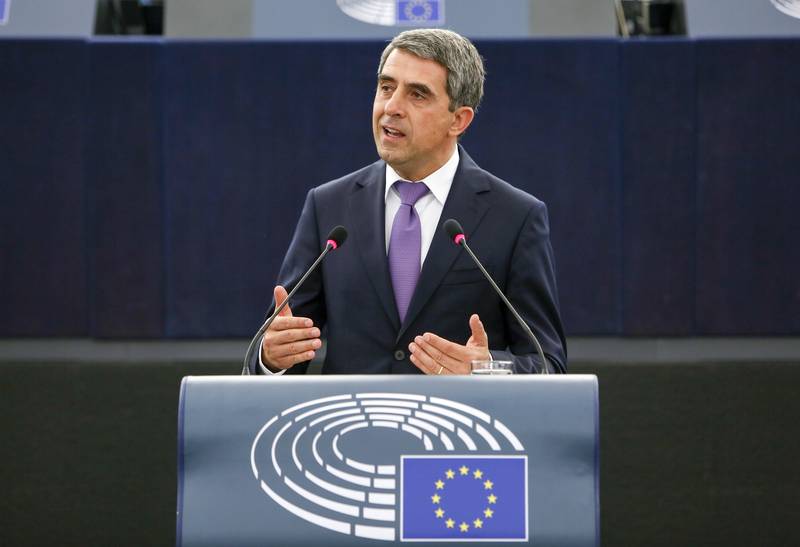 Russia, the eurosceptics, and EU integration were the main topics in Bulgarian President Rosen Plevneliev’s speech to the European Parliament. The largest focus in it was on Russia and its destabilising role to the EU. Not a lesser destructive factor in his opinion is the British referendum, as well as ignoring the Western Balkans. Plevneliev also proposed a new economic model for the development of the EU, which supports shared economy. The Bulgaria head of state’s evaluation of the state of Europe at the moment is that it is facing the greatest security risk since the Second World War. “The same generation that brought down the Berlin Wall is building new walls in the very heart of Europe”, said Mr Plevneliev and got several rounds of applause from the auditorium, which initially was half-empty, but gradually filled.
Russia, the eurosceptics, and EU integration were the main topics in Bulgarian President Rosen Plevneliev’s speech to the European Parliament. The largest focus in it was on Russia and its destabilising role to the EU. Not a lesser destructive factor in his opinion is the British referendum, as well as ignoring the Western Balkans. Plevneliev also proposed a new economic model for the development of the EU, which supports shared economy. The Bulgaria head of state’s evaluation of the state of Europe at the moment is that it is facing the greatest security risk since the Second World War. “The same generation that brought down the Berlin Wall is building new walls in the very heart of Europe”, said Mr Plevneliev and got several rounds of applause from the auditorium, which initially was half-empty, but gradually filled.
Russia wants to destroy the EU
The President disagreed with Moscow’s assessment that, currently, the world is in a state of a new Cold War. He repeated his idea of two years ago, stated at the Munich Security Conference, that at the moment the world is in a state of a Cold Peace. “Peace, because nobody wants a war, but Cold Peace because we see confrontation and methods from the Cold War time - propaganda wars, cyber-attacks, proxy and hybrid warfare. And some countries got “cold”, destabilised and weakened through frozen conflicts”, stated the President.
He urged the West not to fall for provocations from Russia, which wants a new world balance with spheres of influence and interests, distributed among the Great Powers. “Are we heading towards a new Yalta Conference?”, asked the head of state. “If the West allows this, it will be a historic shame. We need to show character, we need to stand up and defend our vision and our project for Europe”, he added and got loud applauses from the MEPs. The aim of politics is to modernise, educate, look for solutions through diplomacy, not to fight. Broken societies can only be repaired by people, not by Great Powers.
As much as we did not want war in Europe ever again, now it is fact – in the Ukraine. “For me, for us, Crimea is Ukraine and Ukraine is Europe”, stated the President. In his opinion, the lack of good knowledge about the past is the reason for populism and the return of nationalisms. The Kremlin is attempting to destabilise the EU by bringing distrust in the very core of the European project. It is attempting to destroy the foundations of the EU, and they, according to Rosen Plevneliev are unity, solidarity, and rule of law. On several occasions he pointed at rule of law as a key European value. The President believes that, at this stage, the plan of Kremlin is succeeding. “It looks like we are not making any progress now. We are stuck, and we’ve stopped the only engine we have – integration. We are pulling the break on enlargement, on Schengen and others”, he said.
Bulgaria is against Europe a la carte
The Bulgarian President stood emphatically against a Europe of different speeds and warned that this would weaken the European project. “Even the suspicion that we can accept Europe to be built 'on different speeds' sends a message of doubt for the European project. It insinuates inequality. It would be a mistake to underestimate the potential for development of some parts of Europe - for example the Balkans. It would be a historic mistake not to support them or leave them to the outside influences from former empires”, stated Rosen Plevneliev and warned that regardless of the result of the referendum on Great Britain’s EU membership on June 23, the “destructive nature” of the discussion about ‘Europe a la carte’ must be avoided. “We cannot pick and choose solidarity and turn the EU into a sum of transactional relationships. Because each country has different issues to deal with, “zero sum” games have had terrible outcomes in the past.”
This message is especially important before the referendum in Great Britain on June 23, for the ambition of British PM David Cameron is, should his country choose to stay in the EU, working for a looser union. Some of his demands got accepted by the leaders of member states.
Rosen Plevneliev believes eurosceptics cannot be persuaded, so the pro-Europeans should be mobilised. The cure is more solidarity, humanity and empathy, more rule of law, education, and more integration. He quoted the first democratically elected President of Bulgaria, the late Dr Zhelyu Zhelev: “You can cure democracy only with more democracy”. Plevneliev pleaded with the EU to take up more integration. “We must not allow Europe to fall into a moral crisis – a crisis of lack of solidarity, a crisis of values”. He urged that the integration process does not skip the Western Balkans. This is a historic chance for them, for it will help them leave behind the “heavy burden of conflicts”.
“Nationalistic doctrines that led to atrocities belong to the past. Therefore, strengthening good neighbourly relations is fundamental for the enlargement policy and a clear indicator, whether the aspiring countries have sincerely embraced core EU values”. The Bulgarian head of state made use of the opportunity to urge that Bulgaria be accepted in Schengen, for it is a loyal partner in the EU and takes good care of the protection of its external border.
Europe, built on principles, not interests
The EU needs to go back to its principles, not succumb to interests. “To reconfirm, not to renegotiate, the principles of rule of law, human rights and freedoms, territorial integrity, sovereignty and inviolability of the borders of each and every state in Europe and the world”, said Plevneliev, thus indirectly criticising the tendencies towards illiberal democracy, which are noticed in Central Europe and its neighbourhood. In this sense Plevneliev announced that Bulgaria is no longer in the European periphery, but has turned into a front-line country on the subjects of the Ukraine, Russia, migration. “Because we, Bulgarians, have learned that you cannot 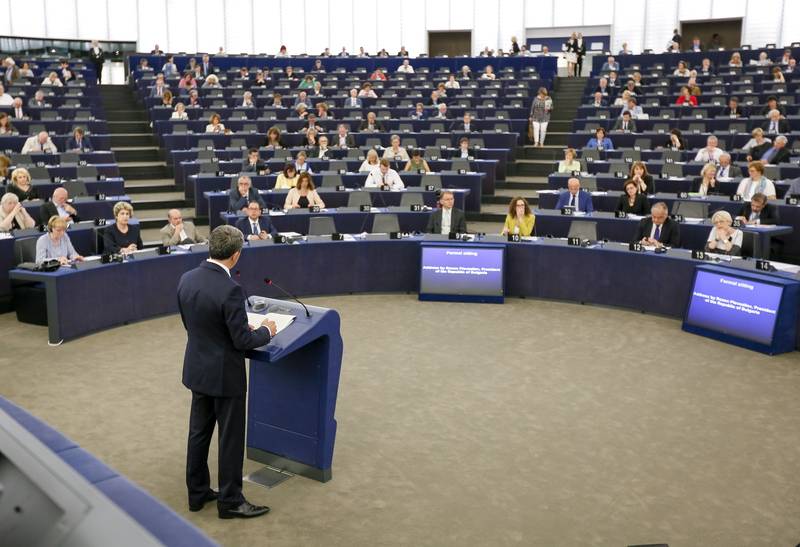 change geography, but only European integration can turn the risks of geography into opportunity”.
change geography, but only European integration can turn the risks of geography into opportunity”.
He gave strong support to the refugee relocation mechanism, but underlined that there should be clear discernment between those, who flee to save their lives and those looking for a better economic perspective. He stated that the key to the integration of migrants is education.
For an open and shared economy
Plevneliev advocated for a new economic model in Europe, which is to be dynamic and open. “We should not fear phenomena like the collaborative and sharing economy, or e-commerce - instead, we must welcome them and use them in the most productive way”, stated the President days after the EC also announced its support for a shared economy and urged that no barriers are placed in front of companies like Uber, Airbnb etc. “Europe must become the leader of the new industrial revolution, of disruptive innovation and digital technologies” is the Bulgarian President’s vision for the future, which is quite similar to the views of his Estonian colleague Toomas Hendrik Ilves.
The Bulgarian head of state ended his speech reminding that Bulgaria was always weak when it stood alone. Today it is powerful in the EU and NATO. He was applauded by the full plenary hall of the European Parliament. MEPs gave him a standing ovation and President Martin Schultz (Socialists and Democrats, Germany) called his speech “brave”.
Translated by Stanimir Stoev
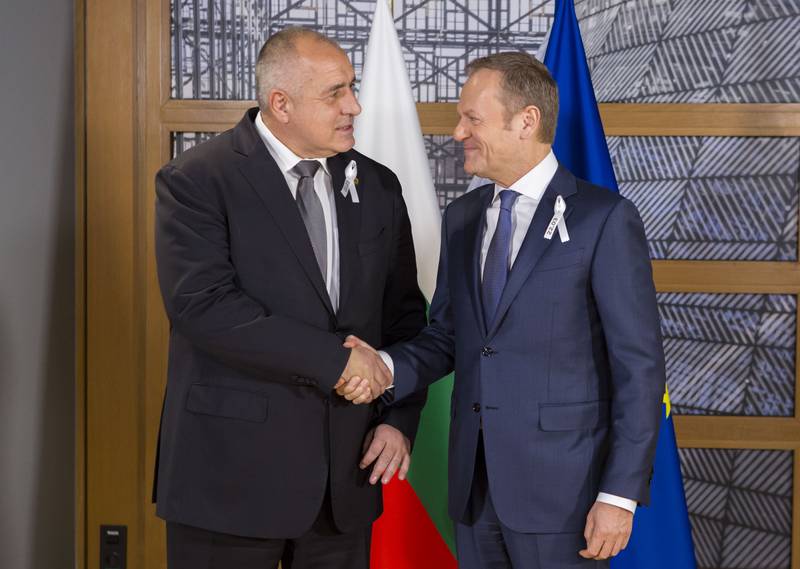 Boyko Borissov, Donald Tusk | © Council of the EU
Boyko Borissov, Donald Tusk | © Council of the EU Boris Johnson | © Council of the EU
Boris Johnson | © Council of the EU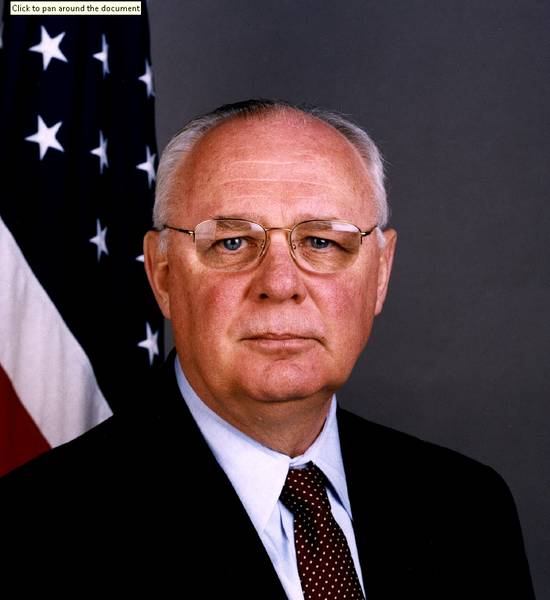 James W. Pardew | ©
James W. Pardew | ©  Bakir Izetbegovic, Andrej Plenkovic | © Council of the EU
Bakir Izetbegovic, Andrej Plenkovic | © Council of the EU Aleksandar Vucic, Recep Tayyip Erdogan | © Serbian Presidency
Aleksandar Vucic, Recep Tayyip Erdogan | © Serbian Presidency Jean-Claude Juncker, Zoran Zaev | © European Commission
Jean-Claude Juncker, Zoran Zaev | © European Commission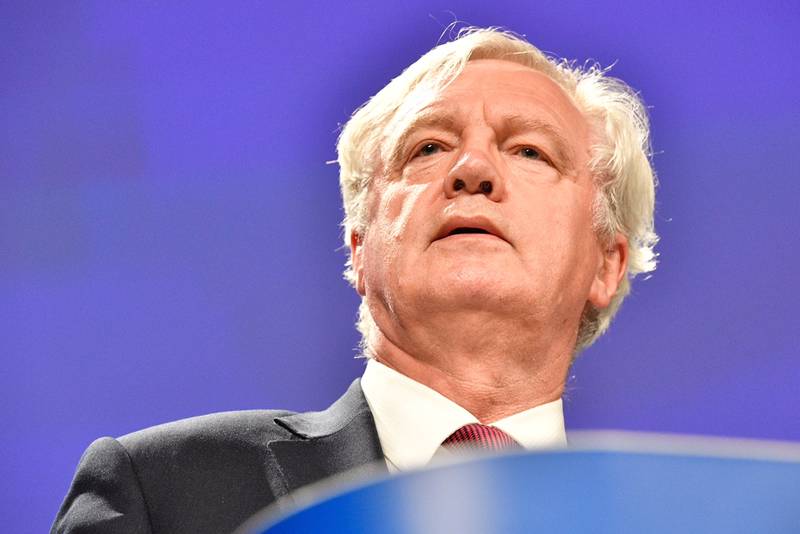 David Davis | © European Commission
David Davis | © European Commission Angela Merkel | © Council of the EU
Angela Merkel | © Council of the EU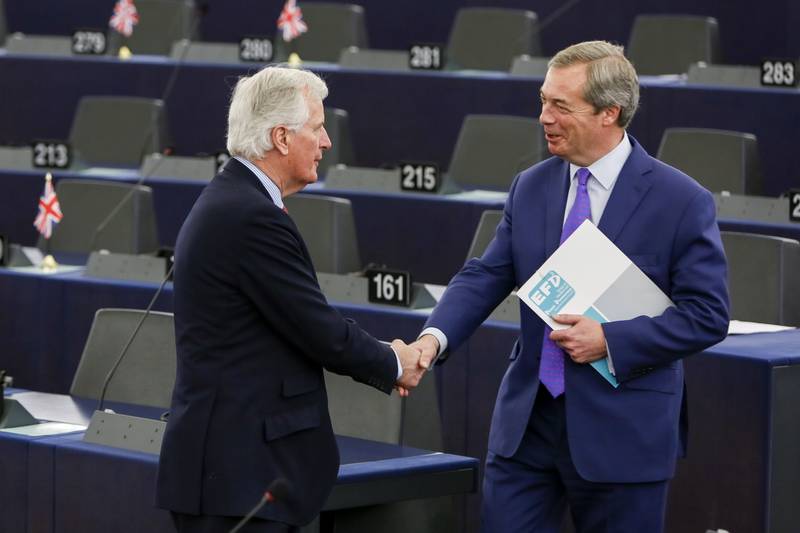 Michel Barnier, Nigel Farage | © European Parliament
Michel Barnier, Nigel Farage | © European Parliament